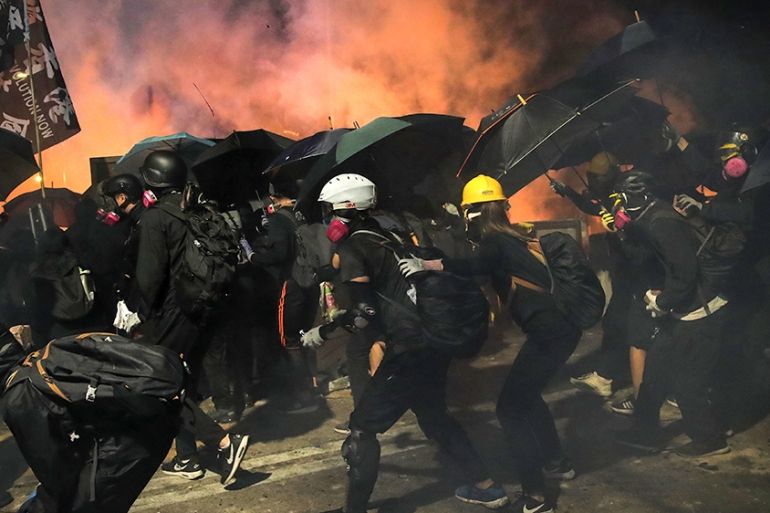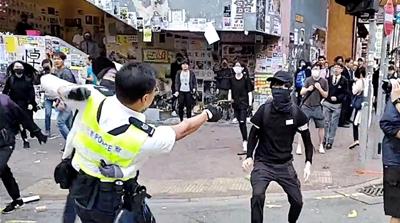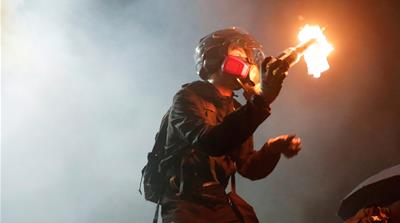Taking stock: Hong Kong’s investors feel the heat of protests
Hong Kong’s share prices take a big knock as anti-government protests become more violent.

Hong Kong, China – Like many people in Hong Kong, Daisy Chan checks her stocks dozens of times every day. Over the past few months, as violent anti-government protests plunged Hong Kong into a major crisis, the stay-at-home mother continued to invest and kept a close eye on the stock market.
And until this week, her investments in stocks have held up surprisingly well in the face of widespread social unrest.
Keep reading
list of 4 itemsHong Kong’s new security law comes into force amid human rights concerns
Hong Kong passes tough new national security law
What is Article 23, Hong Kong’s new draconian national security law?
All that changed on Monday. The mounting violence sent stocks tumbling as investors worried that the economy of the Asian financial hub would go from bad to worse.
“I think the situation could potentially turn very bad, very quickly, so I am paying close attention to the news every day,” Chan told Al Jazeera, noting that she is adopting various strategies to limit her losses, which she said had amounted to “tens of thousands” of Hong Kong dollars ($1 in United States currency is equivalent to roughly 7.8 Hong Kong dollars) at one point earlier in the year.
Since the protests – initially against a proposed and subsequently withdrawn extradition bill – turned violent in June, Hong Kong’s benchmark stock index, the Hang Seng Index (HSI), has fallen nearly eight percent.
From a recent peak last Thursday, $77.5bn worth of market value has been wiped off the stocks on the HSI, according to data provider Refinitiv.
The violence escalated this week as protesters brought their actions to the city’s key business districts, blocking roads and paralysing public transport for three straight days during peak commuting times.
On Monday morning, a protester was shot in the stomach. Hours later, a man was set on fire, seemingly for expressing anti-protest views. A police spokesman issued a warning during a briefing on Tuesday, saying that Hong Kong society “has been pushed to the brink of a total breakdown“.
The months of unrest have hit Hong Kong’s economy hard. The city is already in a recession, its tourism industry is reeling and its infamously high real estate prices – which have long been a source of discontent – have wobbled.
And all this is happening while China battles against US import tariffs on hundreds of billions of dollars of its goods, many of which pass through Hong Kong on their way out of China.
“From large corporates to small stalls, all have experienced the pressure brought by this ‘economic typhoon’,” Hong Kong Financial Secretary Paul Chan wrote in a blog post in August, referring to the US-China trade war.
A turning point?
Until this week, the trade war has had more of a bearing on the movements of the HSI than local events, analysts say. Most of the 50 companies on the stock-market index are either mainland Chinese or overseas companies, with little exposure to Hong Kong’s domestic economy.
But as the protests have escalated in violence, moving to the centre of Hong Kong from its peripheries, and continuing during the working week rather than at the weekend, investors appear to have finally taken note of the violence on their doorsteps.
The HSI fell 2.6 percent on Monday, its worst one-day performance in three months, and continued falling on Tuesday and Wednesday.

“There is no sign the protests will end any time soon and the recent escalation in violence was cited as the major headwind for Hong Kong stocks on Monday,” said Philip Ho, director of BCP Investment Ltd. “I think the Hang Seng Index is underperforming mostly because of the ongoing unrest.”
Even though mom-and-pop investors like Daisy Chan only contributed to around 16 percent of the stock exchange’s trading volume last year – the rest mostly coming from large institutions – the market is something of an obsession for many of Hong Kong’s people.
While default topics of discussion may centre around food, the weather or sports in other cultures, in Hong Kong, it’s the latest company gossip that fills many a lull. Taxi drivers trade stocks on their smartphones while stopped at red lights and senior citizens gather at neighbourhood bank branches to keep an eye on trading screens.
As such, a prolonged decline in share prices could severely hurt many ordinary people, even if it hasn’t started to do so yet.
“I guess people are not panic selling,” Chan said. “I am closely monitoring the situation, but I am not selling too many of my stocks at the moment other than doing some fine-tuning.”
“I thought my investment in stocks in Hong Kong were safe,” she added.
Many investors with far larger portfolios than Chan’s are also bracing for an extended period of uncertainty.
“The worse thing is, I don’t think anyone could say for sure just how bad the whole thing could end,” Chin Ka Fei, executive director at YF Financial, told Al Jazeera. “The differences in values between the protesters and the government are just too huge.”
‘Reborn from the ashes’
But some companies looking to raise funds on the Hong Kong market are betting that the city will survive as one of the world’s top financial centres in the long term.
In the first two weeks of September, eight companies filed applications for initial public offerings (IPOs) in Hong Kong. On September 30, Budweiser Brewing Company APAC, a unit of beer giant Anheuser-Busch InBev, launched a $5bn IPO, the second largest in the world this year.

And after several delays, mainland Chinese e-commerce giant Alibaba is reportedly getting set to launch a roadshow for an IPO in Hong Kong that could be worth as much as $15bn. This would be Alibaba’s second listing – the company’s shares already trade in New York City – and by far the world’s largest IPO this year, with the possible exception of Saudi Arabia’s state oil company, Saudi Aramco.
A spokesman for Alibaba declined to comment to Al Jazeera on the reports.
“Hong Kong has been rocked by many crises before, such as the Star Ferry riots in 1966, the SARS [severe acute respiratory syndrome] epidemic in 2003 and the global financial crisis in 2008, but the city recovered strongly, and I am confident this time it will be the same,” Andy Chan, a director at accountancy firm Zhonghui ANDA CPA, told Al Jazeera. “Things will be affected in the short term, yes. But Hong Kong will be reborn from the ashes like a phoenix, I have no doubt of that.”